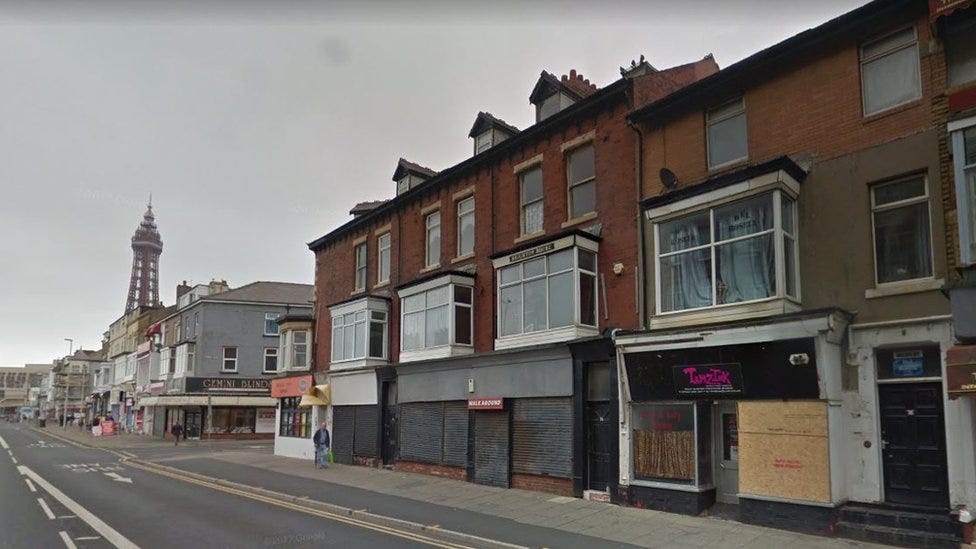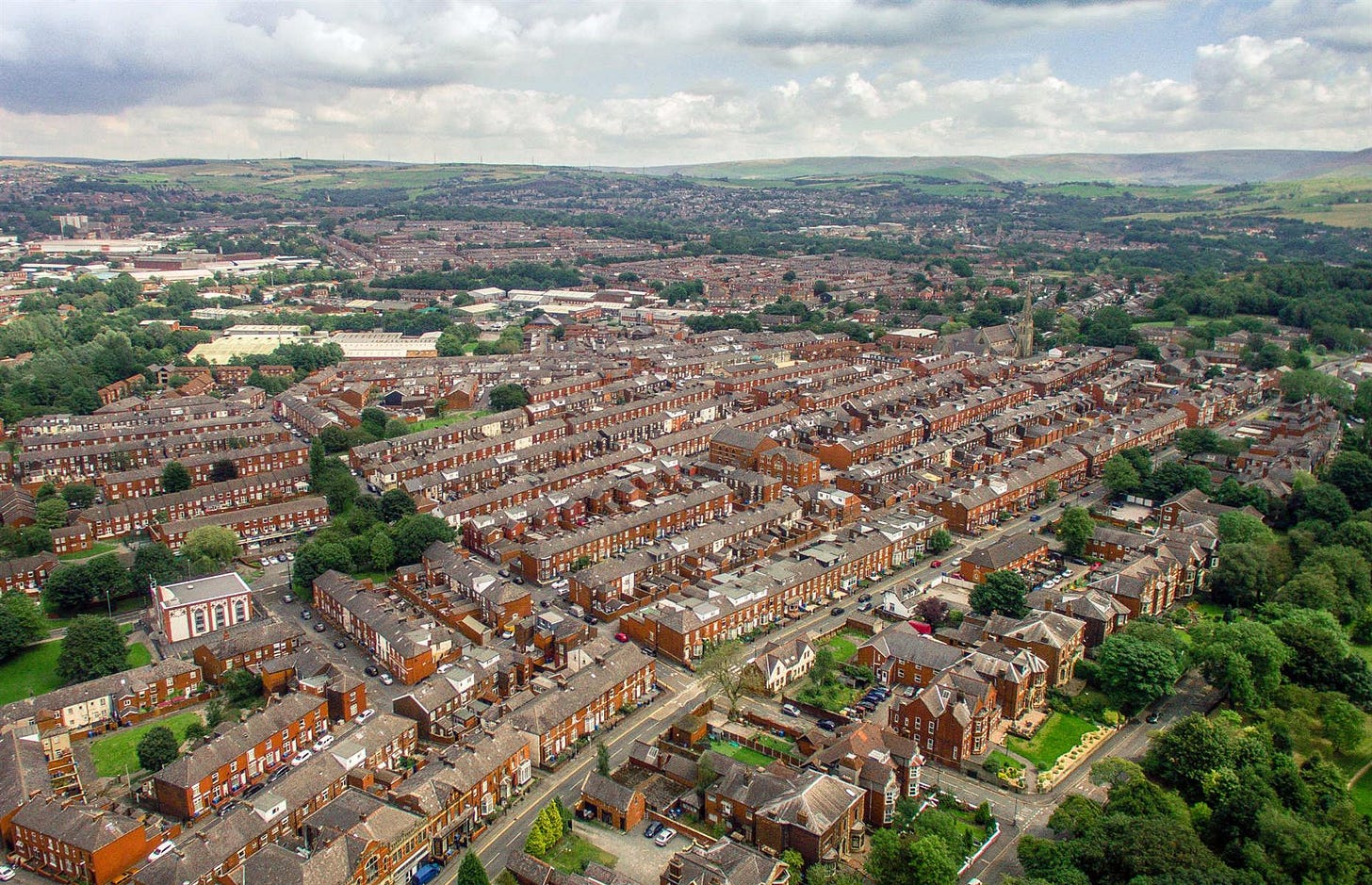Labour's Ideological Deficit
At a time of great economic turmoil, the country is crying out for an alternative. Yet, under Starmer, the centre-left party has become devoid of a clear and articulate vision.
There is a vast, petrifying hollowness to the British economy.
In everyday life, the reassuring facade of the state is still there - the schools, and hospitals, the police and emergency workers. And yet, if you dig below the surface, if you take a minute to look around, you are immediately struck by the eerie feeling that there’s not much left behind that facade. Like the crumbling mansion in Giuseppe Tomasi die Lampedusa’s The Leopard, Britain spends its time in just a few rooms, cordoning off whole wings once thriving with life, dust sheets draped over the armchairs, curtains drawn tight.
No other city embodies this national decline better than Liverpool, which, ironically, was selected as the location for Labour’s annual party conference this October. Before WW2 and the dissolution of the British Empire, this city prided itself on its grand imperial port - a place of extraordinary wealth and prestige. It was obviously not all like that. While Liverpool was a heaving metropolis by the sea, it was also a city of appalling squalor and exploitation; an English Belfast, where Catholics and Protestants crammed into teeming tenements sealed off from each other.
Today, thankfully, life in the city is immeasurably better. The slums have all been cleared, and the sectarian division is all but gone. However, in the absence of the Empire and the northern workshops whose goods the city once transported, Liverpool lost its character. Due to the ever-changing currents of world trade and geopolitics, England’s focus shifted towards Europe, and Liverpool’s geographical location on the west coast became its undoing. Now Felixstowe and Harwich are England’s main ports, not Liverpool.
This phenomenon is not just limited to Liverpool, unfortunately. It haunts every major English city. Birmingham, Manchester, Sheffield, Newcastle - all the great cities of the union outside London’s orbit. All were once major, thriving industrial heartlands that have now fallen into destitution and abandonment.
Everywhere you go in this country - be it the rolling hills of Dorest, the cobblestone streets of York, or the highways of Birmingham - you are greeted by a scene of civic failure. Not only does it manifest itself in low-level littering or graffiti-stained walls, but startling homelessness - beggars slumped outside hotels, lying in tents, pizza boxes slung from their roofs with pleas for help sprawled over them. You don’t need to study the latest GDP figures to know something is wrong with Britain; there is a sickness seeping through the land, a breakdown in our society.
But, why is this so? Why aren’t we more angry? And what can we do to fix this? For conservatives, this decline is a question of waste, inefficiency and spending priorities. To them, local councils are too obsessed with frittering money on diversity training programmes or bloated government contracts that fall into an endless sea of bureaucracy. For Labour, meanwhile, it is the opposite. The declining state of the public realm is due to a harsh austerity regime imposed on it by the central government. Paradoxically, both of these proscriptions are right and wrong.
The Conservatives are right to claim that inefficiency lies at the heart of our government services, but that’s only because accomplishing infrastructure projects like HS2 or Hornsea 3 is now structurally expensive. And cancelling HS2 doesn’t alter this. In fact, it rehabilitates it. It is an admission of gross government failure and ineptitude.
Labour is also right to claim that better funding would solve or reverse some of the decline, but the effectiveness of such a policy can only be guaranteed by addressing Liverpool and other regions’ structural depravity. Central government can alleviate some of the worst excesses of austerity, but it does not change the fact that all British regions, aside from the South East and London, are net drains on the economy - they depend on money being transferred from other parts of the country.
Going back to Liverpool, in the absence of industry, the city’s economy has become mostly dependent on tourism, a trend observable in most urban centres. Cruise-goers splurge their cash on the dock front shops, football fans from across the world trek to the city on their pilgrimage to Anfield, and weekend shoppers drain their weekly savings at LiverpoolOne. While tourism has injected new blood into the once-ailing city, it is hardly a sustainable route to prosperity. The employment linked to this industry is not that of an advanced, highly paid and highly skilled economy such as that of California or the Netherlands. They are often low-paid, seasonal and insecure.
The threat facing the United Kingdom is thus an issue of structural decline, one tracing its origin to the neoconservative reforms championed by Thatcher’s government in the 1980s. Now, profit is the gospel and the pound the messiah. Businesses, like vultures, exploit the corpses of our urban cities while the central government merely spectates, content to continue this plundering. And Brexit and the Covid Pandemic have only exacerbated these structural failings.
Starmer seems to understand the scale of the challenge facing him and Labour should they win the next election. In his conference speech, he spoke of how the past Labour governments had grappled with their own hurdles and that the one facing his would be an amalgamation of all three - a crumbling public realm, an economy falling behind the pace of technology and a society still recovering from the trauma of collective sacrifice. However, the Labour leader’s solutions - if one can call them that - are insufficient.
Starmer seems to be under the impression that just by changing the frontbenches of the government, giving Whitehall a fresh coat of paint and ‘reforming’ the public services, he will be able to reverse 40 years of constant decline.
Disregarding the fact that ‘reform’ is an ambiguous and vague concept whose precise definition varies from person to person, Starmer’s prescriptions amount to nothing more than papering over the cracks. As mentioned previously, the issue our country is facing is a question of structural malaise. Simply reconfiguring a department’s budget or adjusting its goals will not suffice. A bigger, more radical overhaul is needed.
But, fearing the electoral backlash his predecessor suffered at the last election after promising an admirable, yet radical, programme of renewal, Starmer and the party’s apparatus have become largely antipathetic to bringing about large fundamental change, instead preferring to settle for more lukewarm, incremental changes.
As one ministerial aide aptly put it - “The Conservatives can’t offer these changes because of ideological conflict and Labour can’t offer them because of political conflict.”
This is another damning indictment of our democratic process. Imprisoned by the limitations of FPTP, British voters are stuck with two political parties, both of which seem unwilling to step up and offer a solution. We’re thus condemned to a spiralling economic decline with no end in sight.
Right now, we seem to have reached the stage where we are quietly acknowledging the scale of our problems, but are only prepared to offer the most timid of solutions. If there’s a gaping hollowness in the British economy, it is matched by the emptiness of our political rhetoric as well.




